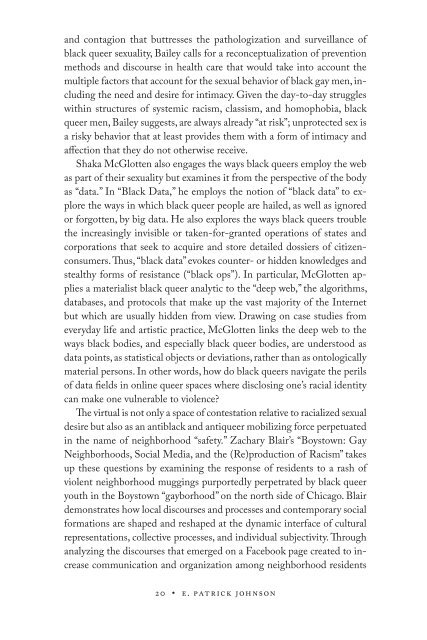No Tea
89AS6wvrf
89AS6wvrf
Create successful ePaper yourself
Turn your PDF publications into a flip-book with our unique Google optimized e-Paper software.
and contagion that buttresses the pathologization and surveillance of<br />
black queer sexuality, Bailey calls for a reconceptualization of prevention<br />
methods and discourse in health care that would take into account the<br />
multiple factors that account for the sexual be hav ior of black gay men, including<br />
the need and desire for intimacy. Given the day- to- day strug gles<br />
within structures of systemic racism, classism, and homophobia, black<br />
queer men, Bailey suggests, are always already “at risk”; unprotected sex is<br />
a risky be hav ior that at least provides them with a form of intimacy and<br />
affection that they do not other wise receive.<br />
Shaka McGlotten also engages the ways black queers employ the web<br />
as part of their sexuality but examines it from the perspective of the body<br />
as “data.” In “Black Data,” he employs the notion of “black data” to explore<br />
the ways in which black queer people are hailed, as well as ignored<br />
or forgotten, by big data. He also explores the ways black queers trou ble<br />
the increasingly invisible or taken- for- granted operations of states and<br />
corporations that seek to acquire and store detailed dossiers of citizenconsumers.<br />
Thus, “black data” evokes counter- or hidden knowledges and<br />
stealthy forms of re sis tance (“black ops”). In par tic u lar, McGlotten applies<br />
a materialist black queer analytic to the “deep web,” the algorithms,<br />
databases, and protocols that make up the vast majority of the Internet<br />
but which are usually hidden from view. Drawing on case studies from<br />
everyday life and artistic practice, McGlotten links the deep web to the<br />
ways black bodies, and especially black queer bodies, are understood as<br />
data points, as statistical objects or deviations, rather than as ontologically<br />
material persons. In other words, how do black queers navigate the perils<br />
of data fields in online queer spaces where disclosing one’s racial identity<br />
can make one vulnerable to vio lence?<br />
The virtual is not only a space of contestation relative to racialized sexual<br />
desire but also as an antiblack and antiqueer mobilizing force perpetuated<br />
in the name of neighborhood “safety.” Zachary Blair’s “Boystown: Gay<br />
Neighborhoods, Social Media, and the (Re)production of Racism” takes<br />
up these questions by examining the response of residents to a rash of<br />
violent neighborhood muggings purportedly perpetrated by black queer<br />
youth in the Boystown “gayborhood” on the north side of Chicago. Blair<br />
demonstrates how local discourses and pro cesses and con temporary social<br />
formations are shaped and reshaped at the dynamic interface of cultural<br />
repre sen ta tions, collective pro cesses, and individual subjectivity. Through<br />
analyzing the discourses that emerged on a Facebook page created to increase<br />
communication and organ ization among neighborhood residents<br />
20 • E. Patrick Johnson


